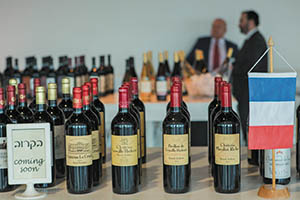

With Purim approaching, we are looking for different, new wines to enjoy over the holiday. Different sure, but also good and interesting, of course. Different in the sense of interesting and diverse as some exciting kosher wines from all over the world have been released recently.
For those of you usually drinking Israeli wines, I suggest to try some new offerings from Spain, Italy or France for Purim. Not necessarily the usual Bordeaux blends and varieties like Cabernet Sauvignon and Merlot but also some different varietals.
Take for example the latest wine released by Capcanes winery from Spain. It is called Samso, as Samso is the name used for the Carignan varietal in Catalonia. “Samso is a muscular wine, made with grapes from over 100-years-old vines,” says Jurgen Wagner, winemaker at Capcanes. Having tasted it a few times myself, I was impressed with the body and structure of the wine. Already quite tasty now, it will also age gracefully.
When mentioning Italian wines, we often think of Bartenura. The red wine drinkers among us, however, are looking for something heavier to accompany the holiday meals. UVA is a very nice, non-mevushal Montepulciano d’Abruzzo. This is a juicy and fleshy wine with notes of smoke and red fruit. It comes from a small boutique winery in Italy and being their first kosher wine, it is impressively well made.
From France we tend to expect a big bold Chateau from Bordeaux that requires some time to age in the cellar. I know you are going to ask yourself, “What could be so different about another wine from Bordeaux?” Well, the difference here is that the new Chateau Greysac is a supple wine from the Medoc appellation that is already easy to drink while having good body and still being unmistakably French.
I would also like to mention here a couple of exciting wines that come from the Loire valley, which is one of the many other growing regions in France. I personally consider the Sancerre Chavignol from Domaine Moreux to be one of the best kosher white wines out there. It is made from Sauvignon Blanc and is not only very aromatic, it features beautiful minerality and fresh citrus flavors as well. Now how about a Cabernet Franc? The Domaine Val de Brun Saumur-Champigny is a wine entirely made from Cabernet Franc as this is the primary red-grape variety grown in the Loire Valley. Lighter than the wines we are used to from Israel and California, it pairs really well with cold cuts and roasted vegetables.
Royal Wine just released some new vintages and wines from Israel that are well worth trying. Shiloh Shor Barbera is a great example. Its flavor profile features red berries and freshness as well as notes of toasted oak. The Sinai is the latest addition to Psagot winery’s portfolio. Psagot Sinai is a blend of Cabernet Sauvignon and Shiraz with rich black fruit flavors and hints of green bell pepper. It would show best paired with a hearty meat stew. Another wine that is already a favorite of mine is the Matar Sauvignon Blanc-Semillon. Matar is the new kosher winery from the Golan Heights. Tal Pelter makes beautifully balanced wines and this one is no exception. With beautiful aromas and flavors of lemon and green apples as well as refreshing acidity, it is quite the hit with fish and salads.
Last but not least, what might be the most appropriate wine for Purim is the Herzog Special Edition Camouflage, a “field blend” of 12 different grape varieties, all grown in the Herzog family’s historic vineyard in California. A wine dressed up in a costume? Now that’s a first! While the style reminds more of Spanish wines, it is really a challenge to guess which varieties are included in this fruit-forward and fascinating wine. Verdelho, Tempranillo, Touriga Nacional are only a few of these intriguing varieties and each of them provides distinctive characteristics to the wine.
These different wines will surely lead to great conversations this Purim, and so much so that I’m confident that, just like me, you may decide to serve them more often at your table for Shabbat, yom tov and all celebratory occasions.
L’chaim! Cheers!










